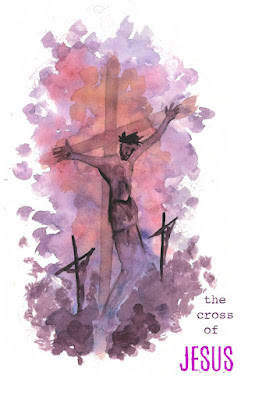Slipped Out--April 1, 2024
"When [the women] looked up, they saw that the stone, which was very large, had already been rolled back. As they entered the tomb, they saw a young man, dressed in a white robe, sitting on the right side; and they were alarmed. But he said to them, 'Do not be alarmed; you are looking for Jesus of Nazareth, who was crucified. He has been raised; he is not here. Look, there is the place they laid him'." [Mark 16:4-6]
Like the old saying goes, you can't keep a good man down.
The way Mark tells the story of the women coming to the tomb two days after Jesus' crucifixion, it is certainly clear that Jesus wasn't staying put. Not even death could hold him in place.
Now, of course, the absence of a body--as well as the lack of an appearance of the risen Jesus for the moment--might at first seem frightening. After all, the women were not expecting a resurrection. When they find the stone rolled back and the body of their rabbi missing from where they had seen it laid late on Friday, their first reaction is panic. Did someone steal the body? Was it another cruel bit of mockery from the Romans who had so clearly savored humiliating Jesus in his last hours? Had they desecrated his body? Had robbers come and pilfered it hoping his disciples had buried him with valuables? What did any of it mean?
But as the mysterious "young man dressed in a white robe" says, while casually sitting inside a crypt, there is no reason to be alarmed. Nothing bad has happened to Jesus' body, not since Friday. The absence of a body is not cause for dread that someone has taken a lifeless corpse from the cave. Rather, the absence of the body is evidence, the anonymous messenger says, that Jesus is alive again. "He is not here," he says. He has been raised. The missing Jesus isn't Missing In Action--rather, he has slipped out of the grip of death itself, and out of the control of the Empire that put him to death, the Respectable Religious Leaders who conspired with them, and even of his own disciples who kept wanting to force Jesus to fit the mold of their expectations. He is loose in the world.
That is good news, undeniably. And so it is absolutely right for us to shout from every hill and valley we can find that "Christ is risen indeed!" while singing our most boisterous alleluias. But this story should also leave us a little unsettled. Because the risen Jesus is even more elusive of our attempts to control, contain, and predict than ever. We are never in charge or in the know over where he will appear next and what he is up to. The risen Jesus will never let himself be our domesticated pet Messiah on a leash, a mascot to endorse our agendas, or our infomercial host to sell our merchandise. He is out of the tomb, yes, and out of the reach of anybody's attempts to control him, tame him, or make him our shill. If we are going to celebrate the resurrection--which is indeed good, right, and salutary to do--then we also need to be honest that the Risen One is also forever unchained and on the loose. Resurrection has a way of making Jesus a bit wild that way. He will appear to give hope to despairing hearts, or restore wayward disciples, or show up behind locked doors, but he will not submit to being our party attraction or hired entertainment. He is utterly free, and there is no version of the Easter story where the risen Jesus only does what the disciple-community expects or orders him to do.
So, dear ones, today is a day to declare with joy the news that death could not hold Jesus, and that he is not in the grave any longer, because he is risen. But at the very same time, today is a day to keep our eyes peeled for the surprising presence of Jesus beyond our control or agendas. He is alive, and will not stay put. He is risen, and that means we should be prepared to meet him wherever this day takes us.
What will we do when we meet him today?
Lord Jesus, surprise us with your risen presence as you will, so that we can recognize you with joy wherever you appear in this wide world.












